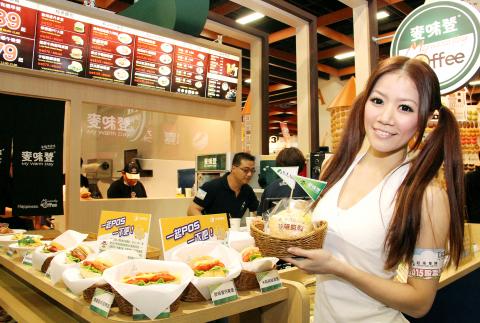Following their success at home, an increasing number of Taiwanese food and beverage operators are looking overseas in the hope of developing into global brands, the Association of Chain and Franchise Promotion Taiwan (台灣連鎖加盟促進協會) said yesterday.
“More Taiwanese chain and franchise players are expanding, with an eye on the global market,” association chairman Tom Hsu (許湘鋐) said at the opening ceremony of the Taipei International Chain and Franchise Spring Exhibition.
The four-day trade show features a record 250 brands occupying 620 booths, the association said.

Photo: CNA
Companies participating in the trade show range from breakfast stores and restaurants to tea shops and retail stores, with food and beverage operators accounting for more than half of the brands showcased.
Hsu said the fair, which runs through Sunday, offers an opportunity for Taiwanese chain and franchise companies to boost their international presence.
For example, OCOCO International Co Ltd (億可國際飲食), which operates bubble tea chain Coco Fresh Tea & Juice (都可茶飲), said it this year offers overseas franchise opportunities, while another bubble tea chain Chatime (日出茶太), managed by La Kaffa International Co Ltd (六角國際事業), said it would provide domestic franchise opportunities this year.
Vice President Wu Den-yih (吳敦義), who also attended yesterday’s opening ceremony, praised the chain and franchise sector for providing growth momentum for the economy.
“The industry generates about NT$800 billion in sales per year,” Wu said.
However, Hsu also advised caution for companies interested in branching out into chains or franchises, saying they should ensure they could generate enough gross profit to cover management costs.
These companies must also be capable of training employees quickly to keep pace with rapid store expansions, he said.
The association expects the show to attract 130,000 visitors, he added.
Meanwhile, speaking at a business forum on Wednesday, Walter Yeh (葉明水), an executive vice president at Taiwan External Trade Development Council (TAITRA), said that Taiwanese chain and franchise operators should think global and expand overseas to boost growth in the service sector.
Yeh said TAITRA had helped many local chain operators open new stores abroad last year, with 60 percent investing in China and others targeting markets such as Indonesia, the UK and Germany.
Taiwan has more than 2,000 franchise and chain operators, but only 140 of them conduct business abroad, he said.
Bureau of Foreign Trade Director-General Chang Chun-fu (張俊福) told the same forum that Taiwan’s franchise and chain sector, which has more operators than any country in the world except for South Korea, the US and China, has been a big contributor to the nation’s economy.
Domestic franchise and chain operators generated revenues of NT$1.75 trillion (US$58.6 billion) last year, accounting for 50 percent of the nation’s retail and food sector sales and 25 percent of the service sector’s sales as a whole, Chang said.

UNCERTAINTY: Innolux activated a stringent supply chain management mechanism, as it did during the COVID-19 pandemic, to ensure optimal inventory levels for customers Flat-panel display makers AUO Corp (友達) and Innolux Corp (群創) yesterday said that about 12 to 20 percent of their display business is at risk of potential US tariffs and that they would relocate production or shipment destinations to mitigate the levies’ effects. US tariffs would have a direct impact of US$200 million on AUO’s revenue, company chairman Paul Peng (彭雙浪) told reporters on the sidelines of the Touch Taiwan trade show in Taipei yesterday. That would make up about 12 percent of the company’s overall revenue. To cope with the tariff uncertainty, AUO plans to allocate its production to manufacturing facilities in

TAKING STOCK: A Taiwanese cookware firm in Vietnam urged customers to assess inventory or place orders early so shipments can reach the US while tariffs are paused Taiwanese businesses in Vietnam are exploring alternatives after the White House imposed a 46 percent import duty on Vietnamese goods, following US President Donald Trump’s announcement of “reciprocal” tariffs on the US’ trading partners. Lo Shih-liang (羅世良), chairman of Brico Industry Co (裕茂工業), a Taiwanese company that manufactures cast iron cookware and stove components in Vietnam, said that more than 40 percent of his business was tied to the US market, describing the constant US policy shifts as an emotional roller coaster. “I work during the day and stay up all night watching the news. I’ve been following US news until 3am

COLLABORATION: Given Taiwan’s key position in global supply chains, the US firm is discussing strategies with local partners and clients to deal with global uncertainties Advanced Micro Devices Inc (AMD) yesterday said it is meeting with local ecosystem partners, including Taiwan Semiconductor Manufacturing Co (TSMC, 台積電), to discuss strategies, including long-term manufacturing, to navigate uncertainties such as US tariffs, as Taiwan occupies an important position in global supply chains. AMD chief executive officer Lisa Su (蘇姿丰) told reporters that Taiwan is an important part of the chip designer’s ecosystem and she is discussing with partners and customers in Taiwan to forge strong collaborations on different areas during this critical period. AMD has just become the first artificial-intelligence (AI) server chip customer of TSMC to utilize its advanced

Six years ago, LVMH’s billionaire CEO Bernard Arnault and US President Donald Trump cut the blue ribbon on a factory in rural Texas that would make designer handbags for Louis Vuitton, one of the world’s best-known luxury brands. However, since the high-profile opening, the factory has faced a host of problems limiting production, 11 former Louis Vuitton employees said. The site has consistently ranked among the worst-performing for Louis Vuitton globally, “significantly” underperforming other facilities, said three former Louis Vuitton workers and a senior industry source, who cited internal rankings shared with staff. The plant’s problems — which have not